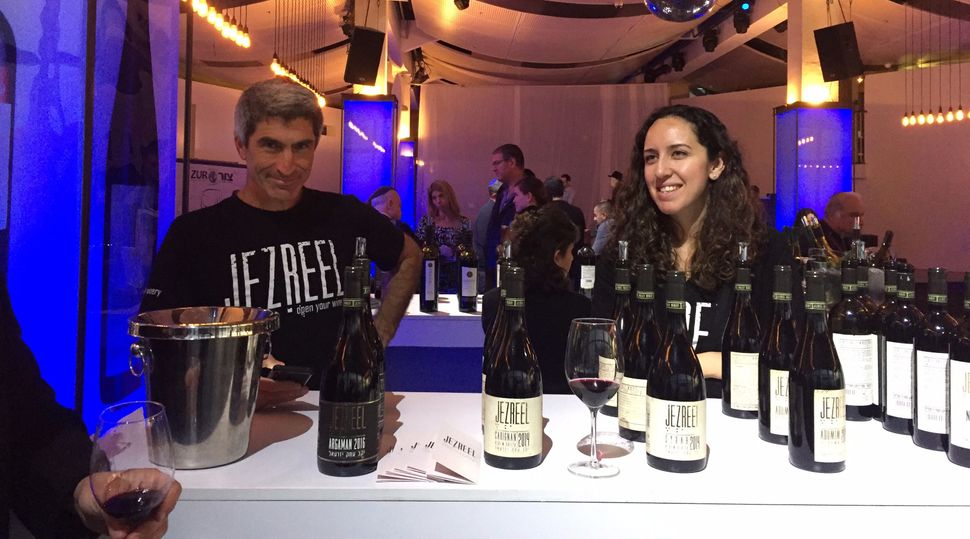Innovation and Indigenous Grapes Define A Boutique Kosher Winery To Watch

Jezreel co-founder Jacob Ner David (left) and marketing director Ma’ayan Klein at the KFWE in Tel Aviv. Image by Sadie Flateman
The surge of Israeli boutique wineries — defined as those producing 20,000 cases or fewer — is hard to miss. Those in the Royal Wine Corp. portfolio include Shiloh, Psgot, Bazelet haGolan, Or Haganuz, Matar, Vitkin and Titora.
One producer, Jezreel Valley Winery, stands out by marketing itself as “true Israeli winemaking” and “original Israeli wine.” The winery puts forward an image of casual enjoyment, and emphasizes that it works with Mediterranean grape varieties, indigenous grapes and Argaman — an Israeli crossing of the grapes Carignan and Sousao (developed in 1972).
If that is not honey enough for the Israeli wine enthusiast, Jezreel’s “Pet Nat” will make your neck turn. The winery’s version of Petillant Natural — a method for making sparkling wine where fermentation finishes in the bottle and traps carbon dioxide under a bottle cap — is made in rosé (from Carignan) and white (Colombard and Dabouki).
Having the opportunity to catch up with Yehuda Nahar, Jezreel’s winemaker and CEO, at KFWE Tel Aviv, he explained that its Pet Nat was the idea of consulting winemaker Ari Erle. Erle, who studied and trained in Napa, brought back a bottle of Petillant Natural from Onward wine in California that the Jezreel team fell in love with. The artisanal single-vineyard wine made by Faith Armstrong Foster had a taste that resonated with them. Nahar said that the winery is looking to make lighter, fresher wines — wines that go with Israeli food and the Mediterranean climate.
As for reds, when asked about the choice to work with the Argaman grape, Erle said that it should be the future of Israeli wine because it is so well-suited to the warm climate, and gets good results: ripening with relatively moderate sugar levels and high acidity, producing a more balanced wine. It is also used to add acidity in their blends. The Jezreel Argaman 2016 is a youthful wine with deep purple color and a cool, blue fruit profile with oak spice and gentle tannins. At 13.9% alcohol, it is an easy-drinking wine. They age the wine in 300 litre oak barrels of 15-20% new wood. Their conviction to make a monovarietal wine from the Argaman grape asserts Jezreel as a winery to watch. Located in the Yesreel Valley in the Lower Galilee, its total current production is just over 4,000 cases annually.
While warm climate can be seen as a limiting factor for wine production in Israel, an equalizer is the possibility for innovation. Whereas the European Union’s strict PDO and PDI wine laws help protect and define wine, there is also a case to be made that it limits creativity and biodiversity. The fact that Israel’s wine laws are as yet undefined and loosely enforced (you can plant what you want where you want within the grapes allowed by the Ministry of Agriculture and Rural Development) may turn out to be one of the industry’s strongest assets.
Sadie Flateman is a specialist in wines of Israel. She lives in New York and has a big appetite.
















